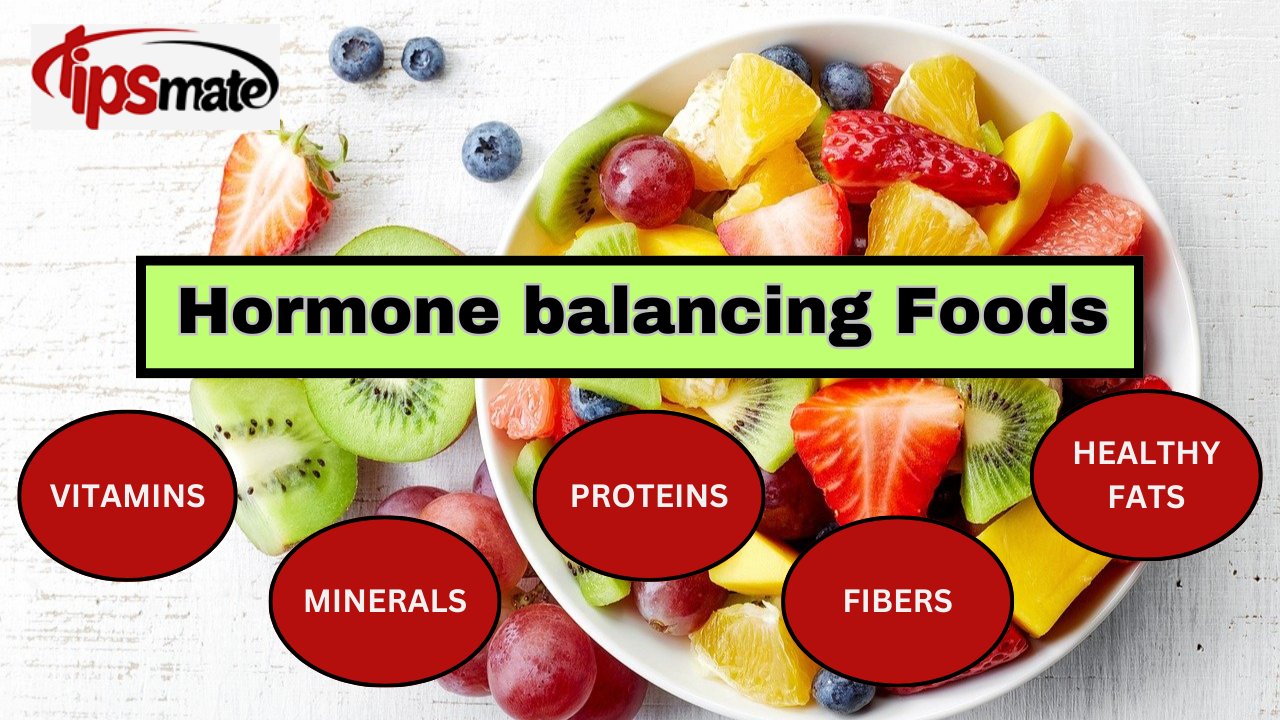Hormone balancing Foods
Hormones play a vital role in balancing almost every function of the body such as it helps in regulating metabolism, reproductive system, moods, and sleep. When hormones are balanced and working properly, we feel focused and active. But imbalance or any fluctuation in hormones leads to many health issues such as tiredness, mood swings, weight gain, etc.
There are different ways to balance our hormones and avoid fluctuation. One of the most effective ways is to eat healthy food. Nutrients in our foods act as powerful tools in restoring balance, and regulation, and provide building blocks for hormone production. Hormone-balancing foods include minerals, healthy fats, and vitamins which can help us to avoid hormonal imbalance and support endocrine health.
In this article, we will discuss the foods you take that will help in improving the balance of hormones and overall health. These hormones can manage our physical as well as mental health. For example,
Cortisol is the hormone that deals with immune responses and emotional stress.
Estrogen and
Progesterone regulate the menstrual cycle and pregnancy in women and
Testosterone supports sperm production in men.
Important Nutrients for Hormonal Health
The foods we eat in our daily lives provide building blocks for hormonal production, their regulation, and overall hormonal health. Adding specific nutrients to our diet can decrease hormonal imbalance and help balance hormones and overall health. Some of the key nutrients that are essential in hormonal health are:
1. Protein
Protein contains amino acids which are important for the production of hormones especially for the growth and repair of hormones such as growth hormone and insulin.
Sources: Eggs, lean meat, poultry, fish, lentils, chickpeas, quinoa, and tofu.
2. Vitamins
Vitamins also play an important role in the regulation of hormones.
- Vitamin D: It supports thyroid function and regulates calcium and phosphorus levels. Hormones related to moods are also affected by this.
Sources: Egg yolks, fatty fish, fortified dairy products, and sunlight.
- Vitamin E: It helps to support the health of the skin and also helps in balancing reproductive hormones.
Sources: Spinach, nuts, and seeds.
- Vitamin B6: This vitamin is helpful in producing dopamine and serotonin hormones.
Sources: Poultry, Potatoes, Bananas, and fortified cereals.
3. Minerals
These minerals should be included in the diet to balance hormones.
- Zinc: Zinc mineral plays its role in the regulation of testosterone levels and it is essential for immune function and fertility.
Sources: Beef, chickpeas, pumpkin seeds, and shellfish.
- Magnesium: It supports thyroid functionality and deals with the stress hormone Cortisol.
Sources: Dark chocolate, spinach, pumpkin seeds, and almonds.
- Selenium: It is important for the production of thyroid hormone.
Sources: Whole grains, tuna, and Brazil nuts.
4. Fiber
Fiber supports the removal of extra hormones such as estrogen and helps in avoiding reabsorption in the bloodstream. It also supports gut health.
Sources: Broccoli, carrots, leafy green vegetables, berries, pears (with the skin), apples, oats, brown rice, quinoa, lentils, and beans.
5. Healthy Fats
Essential hormones such as Cortisol, Estrogen, and Testosterone are made up of fats. So, these hormones are produced and regulated if you take the right type of fats.
Sources:
- Omega-3 Fatty Acids: Chia seeds, Flax seeds, Walnuts, Salmon.
- Saturated fats: Ghee, Coconut oil, Grass-fed butter.
- Monounsaturated fats: Nuts, Olive oil, Avocados.
6. Antioxidants
Antioxidants play an essential role in reducing oxidative stress which can disorder the production of hormone and their signaling.
Sources: Dark chocolate, Green Tea, Berries, Bell peppers, and Tomatoes.
7. Phytoestrogens
These compounds copy estrogen in the body and help in regulating the hormone levels.
Sources: Tofu, edamame, tempeh, sesame seeds, and flaxseeds.
8. Cruciferous Vegetables
Cruciferous vegetables support the liver which helps in the detoxification of extra hormones, especially estrogen.
It is a great source of indole-3-carbinol whose main function is to break down estrogen hormone.
It contains sulforaphane, which supports hormones in metabolism and detoxification.
Brussels sprouts contain specific compounds that help in supporting liver health and detoxification.
Tips for Hormone Balance
- Avoid processed foods, and reduce sugar, trans fats, and carbs in your daily life as they can disturb hormone balance.
- Limit the intake of caffeine as it can elevate cortisol, which affects sleep patterns when used in excess. Thus, it affects hormonal health.
- Persistent stress increases cortisol which can disturb other hormones. So, stress management techniques like exercise, yoga, and meditation should be practiced.
Hydration for Hormone Health
Proper hydration is essential for overall good health and it plays a vital role in hormonal balancing. Proper hydration is essential for blood circulation as hormones are carried through the bloodstream and deliver these hormones to specific body tissues and organs. In addition, proper hydration is beneficial for liver and kidney health because this is essential for detoxifying extra hormones from the body. On the other hand, dehydration leads to several health issues such as hormonal imbalance, fatigue, mood swings, and weight gain.
- Being hydrated is helpful in the maintenance of blood sugar levels. Insulin works appropriately to regulate blood sugar when we are properly hydrated.
- The negative effects of chronic pain are reduced by a healthy balance of cortisol, maintained by proper hydration.
- Particularly in menstruation, staying properly hydrated helps in avoiding bloating which is usually caused by dehydration.
Balancing hormones is always a critical and difficult process. But when you focus on what you eat, you can easily support hormones to balance them. By taking nutrient-dense food such as minerals, proteins, fiber, healthy fats, and leafy green vegetables, and by staying hydrated, you can balance the functions of hormones and overall health.
Proper hydration and taking balanced diet can help in building blocks of the body to maintain hormones efficiently. Along with this, other factors also play an important role in balancing hormones such as getting proper sleep, stress management, regular physical exercise, and yoga gives you energy and helps in a better mood and overall health. Always remember that hormonal balance is a long-term investment. If you want to live life with better health and balanced hormones, always prefer hormone-balancing foods. Always consult your health care specialist for better hormone functions and get health tips about a nutrient-rich diet based on your body's needs.















